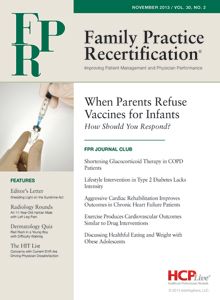Publication
Article
Family Practice Recertification
Concerns with Current EHR Are Driving Physician Dissatisfaction
Author(s):
Though physicians understand the advantages of electronic health records (EHR), their experience with cumbersome health information technology (HIT) systems is increasingly contributing to their professional dissatisfaction.

Though physicians understand the advantages of electronic health records (EHR), their experience with cumbersome health information technology (HIT) systems is increasingly contributing to their professional dissatisfaction, according to a new report commissioned by the American Medical Association (AMA).
For their Factors Affecting Physician Professional Satisfaction and Their Implications for Patient Care, Health Systems, and Health Policy report, Mark Friedberg, MD, and colleagues at nonprofit think tank RAND surveyed and/or interviewed 447 physicians and other healthcare professionals from 30 practices across Colorado, Massachusetts, North Carolina, Texas, Washington, and Wisconsin concerning factors related to physician satisfaction, including EHR use.
Though the report authors “found that EHRs had important effects on physician professional satisfaction, both positive and negative,” they noted that “for many physicians, the current state of EHR technology appeared to significantly worsen professional satisfaction in multiple ways.”
For example, the survey portion of the project found that 61% of physician respondents indicated that their EHR systems require them to perform time-consuming tasks that other office staff could adequately handle, and 43% said their EHRs slow down their delivery of clinical care. Additionally, 36% of physicians expressed that their EHRs interfere with patient-doctor communication during face-to-face care, and 31% said they receive an overwhelming number of EHR-related messages in their practices. Despite those shared frustrations, only one-fifth of survey respondents said they would prefer to switch back to paper medical records based on their experience with current electronic methods.
“Physicians believe in the benefits of EHR, and most do not want to go back to paper charts. But at the same time, they report that electronic systems are deeply problematic in several ways,” Friedberg said in a statement about the study. “Physicians are frustrated by systems that force them to do clerical work or distract them from paying close attention to their patients.”
The findings uncovered in the interview portion weren’t much different, especially those regarding physicians’ views on data entry tasks related to EHR. For instance, 1 primary care physician (PCP) expressed that “what’s really happened is since going on (the EHR) is that I’ve really taken on the responsibility of transcription as well as billing. The derogatory term in residency was ‘scutwork,’ and that’s what (the EHR) has done.”
Other physicians interviewed by the RAND researchers pointed out that the cost of switching and maintaining EHRs exposed their practices to significant financial risks that ultimately outweigh the technology’s benefits. One PCP noted that EHR “is not just a one-time investment; it is a hugely expensive, ongoing, every freaking day investment.”
“Over the years, I have spent probably three-quarters of $1 million since (adopting our) EHR, because every year, you pay 20% of the value of it, and there’s sometimes between $8,000 and $15,000 a year in support fees,” the PCP related to the interviewer. “A practice this size can’t really justify somebody that’s $2,000 a month for IT support.”
On a brighter note, the report authors discovered that “almost universally within our study sample, physicians reported support for EHRs in concept (and) some physicians hoped that future developments in artificial intelligence and health information exchange would solve problems with current EHRs.” In addition, medical practices reported experimenting with methods to help physicians focus their EHR interactions on tasks that actually require their extensive medical training.






